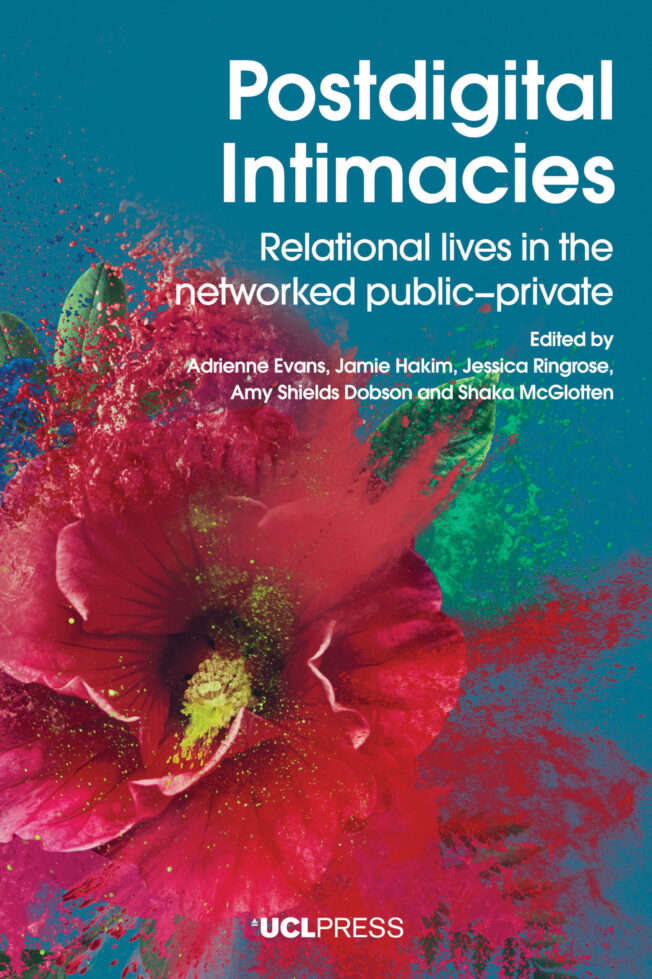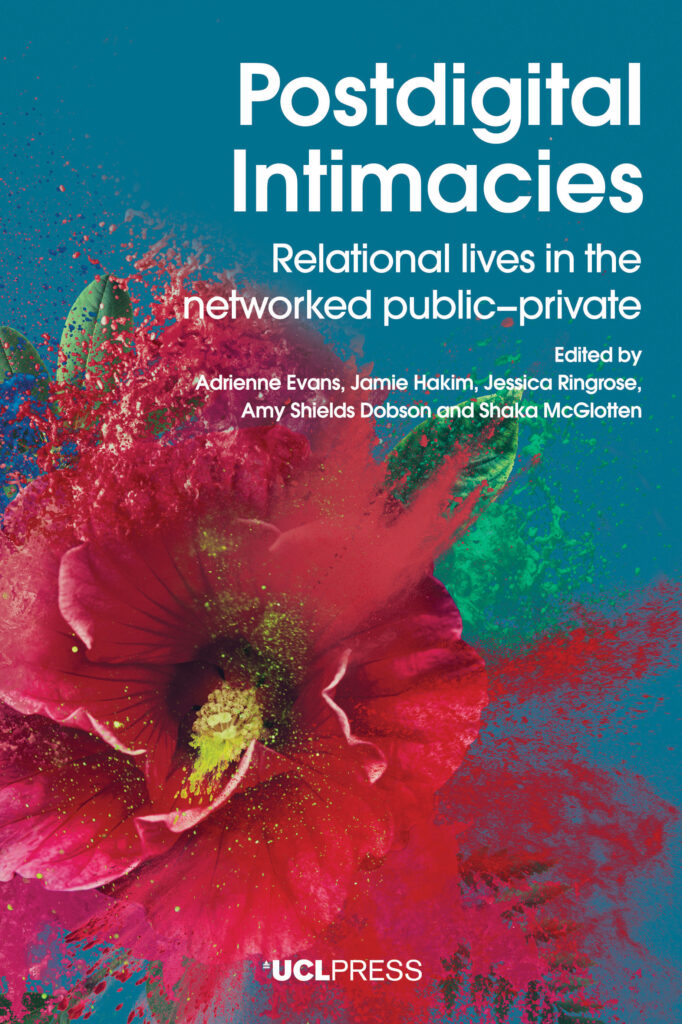
Postdigital Intimacies
Relational lives in the networked public-private
Adrienne Evans (Editor), Jamie Hakim (Editor), Jessica Ringrose (Editor), Amy Shields Dobson (Editor), Shaka McGlotten (Editor)
Postdigital Intimacies presents a unique and timely collection of research into the complex interplay and entanglement between digital and analogue relationships. Set within the normalisation of digital technology, cultures, AI and algorithms, the book explores social, political and cultural implications of intimacy in a blurry public–private. Chapters are informed by intersectional feminist, queer, anti-racist and postcolonial theories, and show how research can be part of creating affirmative, collective worlds that are more equitable and socially just. Through these lenses, contributors uncover vibrant digitally mediated lives and sociality. They investigate the vibey, emotional and affective sensibilities evolving online – excitement, boredom, mental health, survival – and reveal new activisms formed through digital belonging and a networked identity that responds to and resists marginality.
Consideration is given to the capacity for digital affordances to enable new forms of connection, community and solidarity as well as harm. Authors explore vulnerability and risk through image-based abuse and gendered and sexual violence. They also analyse the forms of digital surveillance, labour and platformed capitalism that shape intimate relations created in kinship and domesticity. By addressing these relationalities as postdigital intimacies, the chapters offer fascinating insights and timely analyses of the intimate relations that emerge from our current cultural and postdigital condition.
List of figures
List of contributors
1 Postdigital intimacies: an introduction
Adrienne Evans, Shaka McGlotten, Jamie Hakim, Amy Shields Dobson and Jessica Ringrose
Part I: Postdigital feelings
2 The vibe factory: intimacy, affective capitalism and digital media
Maria Gemma Brown, Nicholas Carah and Amy Shields Dobson
3 Boring intimacies: #BoredVibes and the affective public-private
Tina Kendall
4 Intimate matters: privacy and security and networked mental health support
Marjo Kolehmainen
5 Sinéad O’Connor, ‘bipolar’ celebrity and mediated intimacies: towards a mad feminist temporal politics
Debra Ferreday
Part II: Postdigital connections and collectivities
6 Postdigital intimacies and digital feminist activism
Estefanía Reyes and Kaitlynn Mendes
7 Affect, Black diaspora, and postdigital: moving towards a theory of Black digital relational intimacies
tèmítópé lasade-anderson
8 Queer social media imaginaries and relational becoming amongst sapphic youth
Niamh White
9 (Dis)embodied feminist rage and the affective economies of postdigital visibility
Xumeng Xie
Part III: Postdigital violences and vulnerabilities
10 Bypassing consent? A postdigital platform affordance methodology for exploring youth experiences of Snapchat
Jessica Ringrose
11 Sexual harm and image sharing: rethinking and reimagining gender, power and intimacy with and for adolescent boys
Emily Setty
12 Sexting risk and negotiations of consent in masculinity identity construction
Rikke Amundsen
13 The deepfake, the screenshot and the leak: vulnerable visibilities of the body in postdigital intimacies
Emily van der Nagel
14 Nude image sharing and image-based sexual abuse on Netflix’s Sex Education and HBO’s Euphoria
Tanya Horeck
Part IV: Postdigital kindship, domesticity and hospitality
15 Postdigital queer kinship: intimacy, choice and the market
Rikke Andreassen and Ulrika Dahl
16 ‘Home is where the data is’: what is at stake in the trade in data-households?
Alison Winch
17 Migrant domestic women workers’ cartographies of care: a postdigital feminist scoping review
Zoe Hurley
18 If you liked it, then you should have put a ring on it: self-tracking and intimacy in wearable tech
Lindsay Balfour
Index
DOI: 10.14324/111.9781806550531
Number of illustrations: 9
Publication date: 16 March 2026
PDF ISBN: 9781806550531
EPUB ISBN: 9781806550548
Hardback ISBN: 9781806550517
Paperback ISBN: 9781806550524
Adrienne Evans (Editor) 
Adrienne Evans is Professor of Gender and Culture in the Centre for Arts and Creative Cultures at Coventry University, UK. Her current work is interested in how digital positivity cultures create new intimate relations that shape how we navigate the world, and how we can do positivity otherwise. She is co-author with Sarah Riley of Technologies of Sexiness (2014) and Digital Feeling (2023) and co-author with Sarah Riley and Martine Robson of Postfeminism and Health (2018) and Postfeminism and Body Image (2022). She co-founded with Jessica Ringrose the AHRC network Postdigital Intimacies and the Networked Public-Private.
Jamie Hakim (Editor) 
Jamie Hakim is Senior Lecturer in Media and Cultural Studies at King’s College, London. His research interests lie at the intersection of digital cultures, intimacy, embodiment and care. His book Work That Body: Male Bodies in Digital Culture was published by Rowman & Littlefield in 2019. His co-authored, open access book Digital Intimacies: Queer Men and Smartphones in Times of Crisis was published by Bloomsbury Academic in 2024. As part of the Care Collective he has also co-authored The Care Manifesto: The Politics of Interdependence (Verso, 2020).
Jessica Ringrose (Editor) 
Jessica Ringrose is Professor of Sociology of Gender and Education, and Co-Director of the Centre for Sociology of Education and Equity at UCL. Her research explores young people’s gender and sexual diversities, cultures and activisms, sex education and digital literacy. She has worked with a wide range of global stakeholders and academics to shape policy and practice in areas of education, communications, and justice. In 2020 she was the recipient of The American Educational Research Association (AERA) Distinguished Contributions to Gender Equity in Education Award. Her latest book is Teens, Social Media and Image Based Abuse (Palgrave, 2025).
Amy Shields Dobson (Editor) 
Amy Shields Dobson is Associate Professor and program convenor of Digital and Social Media at Curtin University. They also lead the Digital Intimacies research stream within Curtin’s Centre for Culture and Technology. They are an expert across gender and feminism, gendered subjectivities, youth, and social media. They are the author of Postfeminist Digital Cultures (2015), co-author of Media and Society(in press) and co-editor of Digital Intimate Publics and Social Media (2018).
Shaka McGlotten (Editor)
Shaka McGlotten is Professor of Media Studies and Anthropology at Purchase College-SUNY, where they are also Chair of the Gender Studies program and Co-Chair of Media Studies. An anthropologist and artist, McGlotten’s interdisciplinary research explores the intersections of black study, queer theory, digital media, and contemporary art. They are author of Dragging: Or, In the Drag of a Queer Life (Routledge, 2021) and Virtual Intimacies: Media, Affect, and Queer Sociality (SUNY Press, 2013) and co-editor of Black Genders and Sexualities (with Daná-ain Davis) and Zombies and Sexuality (with Steve Jones). Data & Society, the Alexander von Humboldt Foundation, Akademie Schloss Solitude, and The Andy Warhol Foundation have supported their work.
Related titles
The Global Smartphone
Daniel Miller, Laila Abed Rabho, Patrick Awondo, Maya de Vries, Marília Duque, Pauline Garvey, Laura Haapio-Kirk, Charlotte Hawkins, Alfonso Otaegui, Shireen Walton, Xinyuan Wang,
06 May 2021
How the World Changed Social Media
Daniel Miller, Elisabetta Costa, Nell Haynes, Tom McDonald, Razvan Nicolescu, Jolynna Sinanan, Juliano Spyer, Shriram Venkatraman, Xinyuan Wang,
29 February 2016
Postdigital Intimacies
Relational lives in the networked public-private
Postdigital Intimacies presents a unique and timely collection of research into the complex interplay and entanglement between digital and analogue relationships. Set within the normalisation of digital technology, cultures, AI and algorithms, the book explores social, political and cultural implications of intimacy in a blurry public–private. Chapters are informed by intersectional feminist, queer, anti-racist and postcolonial theories, and show how research can be part of creating affirmative, collective worlds that are more equitable and socially just. Through these lenses, contributors uncover vibrant digitally mediated lives and sociality. They investigate the vibey, emotional and affective sensibilities evolving online – excitement, boredom, mental health, survival – and reveal new activisms formed through digital belonging and a networked identity that responds to and resists marginality.
Consideration is given to the capacity for digital affordances to enable new forms of connection, community and solidarity as well as harm. Authors explore vulnerability and risk through image-based abuse and gendered and sexual violence. They also analyse the forms of digital surveillance, labour and platformed capitalism that shape intimate relations created in kinship and domesticity. By addressing these relationalities as postdigital intimacies, the chapters offer fascinating insights and timely analyses of the intimate relations that emerge from our current cultural and postdigital condition.

